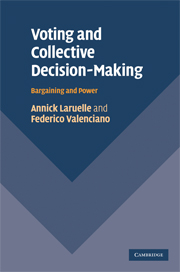Crossref Citations
This Book has been
cited by the following publications. This list is generated based on data provided by Crossref.
Diskin, Abraham
and
Koppel, Moshe
2010.
Voting power: an information theory approach.
Social Choice and Welfare,
Vol. 34,
Issue. 1,
p.
105.
Laruelle, Annick
and
Valenciano, Federico
2010.
Egalitarianism and utilitarianism in committees of representatives.
Social Choice and Welfare,
Vol. 35,
Issue. 2,
p.
221.
Fiestras-Janeiro, M. Gloria
García-Jurado, Ignacio
and
Mosquera, Manuel A.
2011.
Cooperative games and cost allocation problems.
TOP,
Vol. 19,
Issue. 1,
p.
1.
Napel, Stefan
and
Widgrén, Mika
2011.
Strategic versus non-strategic voting power in the EU Council of Ministers: the consultation procedure.
Social Choice and Welfare,
Vol. 37,
Issue. 3,
p.
511.
Freixas, Josep
2011.
Wiley Encyclopedia of Operations Research and Management Science.
Laruelle, Annick
and
Valenciano, Federico
2011.
Consensual Processes.
Vol. 267,
Issue. ,
p.
135.
Laruelle, Annick
and
Valenciano, Federico
2011.
Majorities with a quorum.
Journal of Theoretical Politics,
Vol. 23,
Issue. 2,
p.
241.
van den Brink, René
and
Steffen, Frank
2012.
Axiomatizations of a positional power score and measure for hierarchies.
Public Choice,
Vol. 151,
Issue. 3-4,
p.
757.
Wolff, Reiner
and
Karagök, Yavuz
2012.
Consistent allocation of cabinet seats: the Swiss Magic Formula.
Public Choice,
Vol. 150,
Issue. 3-4,
p.
547.
Monroy, Luisa
and
Fernández, Francisco R.
2012.
Stable sets and cores for multi-criteria simple games and for their extensions.
Social Choice and Welfare,
Vol. 39,
Issue. 1,
p.
1.
Laruelle, Annick
and
Valenciano, Federico
2012.
Quaternary dichotomous voting rules.
Social Choice and Welfare,
Vol. 38,
Issue. 3,
p.
431.
Le Breton, Michel
Montero, Maria
and
Zaporozhets, Vera
2012.
Voting Power in the EU Council of Ministers and Fair Decision Making in Distributive Politics.
SSRN Electronic Journal,
Artabe, Alaitz
Laruelle, Annick
and
Valenciano, Federico
2012.
Preferences, actions and voting rules.
SERIEs,
Vol. 3,
Issue. 1-2,
p.
15.
Lahrach, Rahhal
and
Merlin, Vincent
2012.
Electoral Systems.
p.
129.
van den Brink, René
and
Steffen, Frank
2012.
On the Measurement of Success and Satisfaction.
SSRN Electronic Journal,
Laruelle, Annick
and
Valenciano, Federico
2013.
Power, Voting, and Voting Power: 30 Years After.
p.
137.
Koster, Maurice
Kurz, Sascha
Lindner, Ines
and
Napel, Stefan
2013.
The Prediction Value.
SSRN Electronic Journal,
BERTINI, CESARINO
FREIXAS, JOSEP
GAMBARELLI, GIANFRANCO
and
STACH, IZABELLA
2013.
SOME OPEN PROBLEMS IN SIMPLE GAMES.
International Game Theory Review,
Vol. 15,
Issue. 02,
p.
1340005.
Nohn, Andreas
2013.
Power, Voting, and Voting Power: 30 Years After.
p.
703.
Koriyama, Yukio
Laslier, Jean-François
Macé, Antonin
and
Treibich, Rafael
2013.
Optimal Apportionment.
Journal of Political Economy,
Vol. 121,
Issue. 3,
p.
584.





